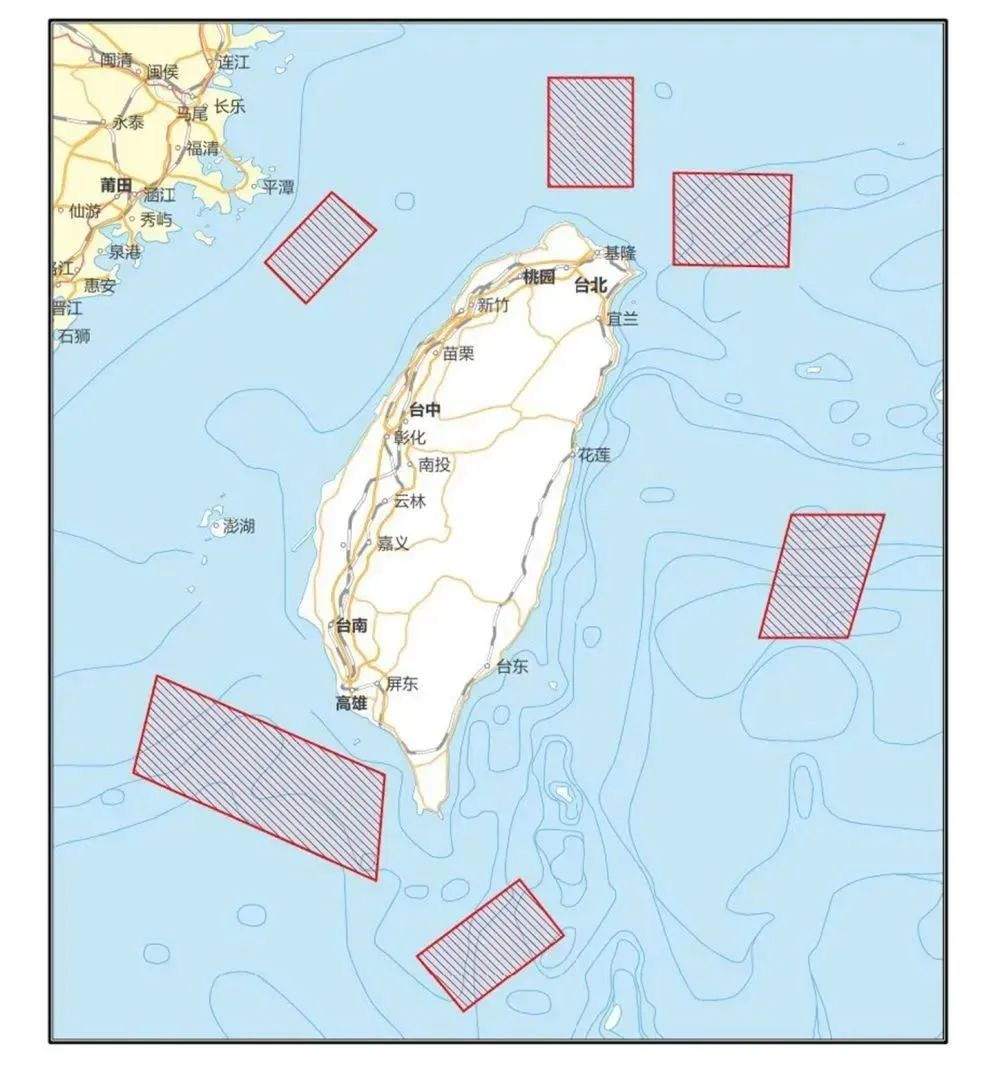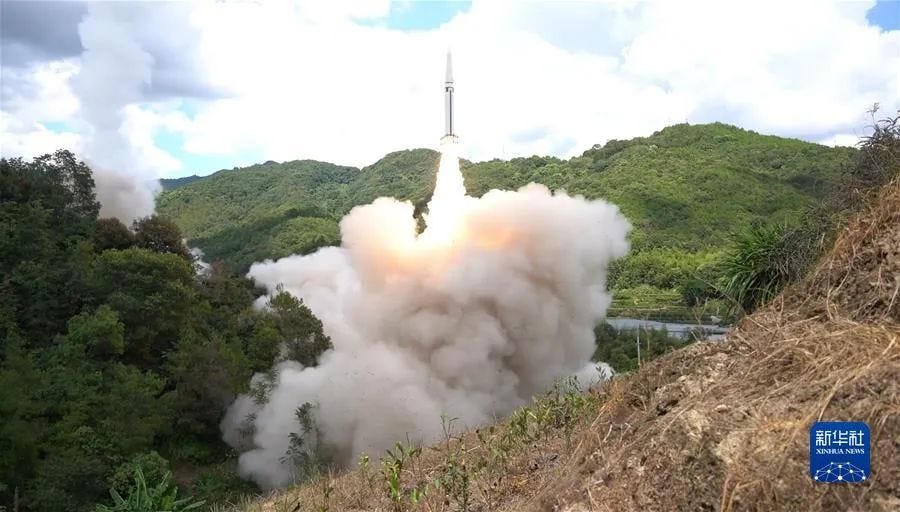The Taiwan question: crises and opportunities -- views from Prof. Zheng Yongnian
"In terms of national reunification, being rational is more important than being emotional."
I guess many of you have read lots of news and articles about Taiwan in the past week and some of you might have read something which is different from your views. Actually, it seems to me that the current situation in the Taiwan Strait pushes many of us to revisit or dive deeper into the Taiwan question. Honestly, I don’t know whether that will help each side and party approach this question better in the future, but that is the hope of this newsletter.
Below is a translation of 郑永年 Professor Zheng Yongnian's interview on the Taiwan question for 侠客岛 Xiakedao, a social media account run by the overseas edition of the People's Daily. The interview was posted on WeChat on August 5.
In the interview, Prof. Zheng shared his views on Chinese netizens’ reactions to Nancy Pelosi’s visit to Taiwan, the significance of PLA’s large-scale military exercises, potential military conflicts between China and the US, and how China should use the current situation as an opportunity to better achieve the goal of national reunification.
Prof. Zheng is currently the Presidential Chair Professor and the Founding Director of the Advanced Institute of Global and Contemporary China Studies (GCCS), the Chinese University of Hong Kong, Shenzhen (CUHK-SZ).
He previously served as the former Director of the East Asian Institute, National University of Singapore (2008-2019), and the former Research Director and Professor of the China Policy Institute, University of Nottingham (2005-2008).
Prof. Zheng has long been an influential voice in the Chinese mainland. For example, he was invited to speak at a meeting with the top leadership in 2020 on China’s 14th Five Year Plan (2021-2025), as reported by the prime-time news program on China Central Television (CCTV) then.
Ginger River knows that the interview contains some views which not every subscriber will agree with, but he guesses exposure to some different Chinese views is at least partly what you look for.
Q1: Netizens in the Chinese mainland were furious about Pelosi's visit to Taiwan. Many said they "couldn't sleep at all that night [of the visit]." What do you think of the sentiment?
Prof. Zheng: The sentiment expressed by the general public in the Chinese mainland is natural. For Chinese people, the Taiwan question is a matter of sovereignty and is a topic most likely to stir up national emotions. I am emotional about this too. At present, the US has no regard for China's national interests and the feelings of the Chinese people, so it is natural for people to be angry, which is a strong sign of Chinese people's national identity. But after the emotion wanes, it is more important for us to think about how to maximize our national interests on a practical level.
***
Q2: There are many voices talking about 面子 "external face" and 里子 "internal content", in other words, how to fight for the actual national interests. The People's Liberation Army (PLA)'s large-scale military exercises beginning on August 4 expressed our firm determination to defend our territorial sovereignty. What do you think of countermeasures done by the Chinese mainland?
Prof. Zheng: I read that some Western military experts specializing in China, including the US ones, said that China's countermeasures were much stronger than those of the 1996 Taiwan Strait Crisis. And what China did this time is equal to creating a military blockade and basically cutting Taiwan off. I would like to point out that China does not lack the ability to do "reunification by force". But it is a matter of national reunification after all, and being rational is more important than being emotional, as we strive to achieve the larger goal of national reunification at a minimal cost.
PLA's military exercises (Source: Xinhua)
To solve the Taiwan question, we need to understand the root first. The current crisis in the Taiwan Strait was the result of a few U.S. politicians in collusion with a few political figures in Taiwan, so the sanctions and counterattacks must be precise.
For example, Pelosi's visit to Taiwan reflects that populism in American politics has risen from the social level to the government level, resulting in a kind of "anarchy" in the government. The two parties in Congress bickered with each other, and the White House said that it can't stop the Speaker of the House from visiting Taiwan. It shows that the so-called separation of powers and the system of checks and balances in the US have essentially gone into paralysis. And those in power in the US are acting on their own, focusing on their own self-interest.
In fact, starting from Trump's rule, U.S. domestic politics have been unruly. And it constantly trespassed the boundary of the Taiwan question. The two parties are now in a vicious competition on the Taiwan question, fighting to be more ruthless. Politicians like Pelosi and Pompeo are the same. The White House needs to take care of the Russia-Ukraine conflict, and handle the chaos of internal affairs, which means it has no time to take care of Taiwan. Therefore, the White House says it wants to establish "guardrails". But to our surprise, the US actually wants to dump the responsibility of setting "guardrails" on China.
For those politicians, there is no such thing as national interests, only their votes are real, so it's no doubt which one they would choose. Politicians can sell themselves in the rhetoric of national interest, such as "democracy" and "freedom", which is nothing new. Even if the President cannot interfere with Congress, he could've made a phone call to express his objection. The [real] reason is that two parties are fighting over voters for the midterms -- whoever goes soft on China will be in a weaker position.
In general, the U.S. leadership is chaotic. Indeed, China doesn't care about the motive behind the visit, it focuses solely on the result. Pelosi's visit is a poor display of the U.S. No. 3 political figure trespassing on China's bottom line.
Many researchers and professionals in the U.S. think tank believe that Pelosi's Taiwan trip is "bad timing". Biden also said that the U.S. military believes the visit is "not a good idea". Why would she provoke a major country for no reason? This is what selfish politicians do when self-interests lead them by the nose. It symbolizes the fall of U.S. political wisdom, not U.S. toughness.
Not only the United States, but even members of the House of Commons in the UK have swooped in to play the "Taiwan card". It is really strange that they jump out to "protect Taiwan's democracy" when their own democracy is faltering. The populism of the U.S. and Britain has penetrated into the elite politics and the political system has become very sick. It is sad that these old "beacons of democracy" are always dumping their problems on the outside world.
***
Q3: From the last U.S. administration to the present, U.S. politicians have barely stopped meddling in the Taiwan question, constantly hollowing out the one-China principle. Some analysts believe that the downward global economy may intensify geopolitical risks, and many are worried about the outbreak of military conflicts in the Taiwan Strait. What do you think about this?
Prof. Zheng: The Taiwan question is a component in Sino-US relations, the most important and sensitive component, but not the whole picture. On the Taiwan question, it is not the case that a war with the US will lead to national reunification. Some think that the problem can be solved by defeating the US and driving it out of the western Pacific, but I believe this is a narrow-minded way of thinking.
Why would I say that? Because losing Taiwan weighs differently for the US and China. For the US, Taiwan is a place in the Western Pacific Region, which means a card to play against China in the geopolitical chess game. But for China, Taiwan is a matter of national reunification. This is the biggest difference. The US has always used Taiwan as a tool to maintain its global hegemony and restrain China, but the problem is that betting on Taiwan is likely to accelerate the decline of the US.
In history, the side that represents the interests of politicians and not the interests of the nation can never beat the side that represents the interests of all the people. Except for the bombing of Japan with nuclear weapons, the US lost all the wars in Asia, including North Korea, Vietnam and Afghanistan. Even if a conflict breaks out in the Taiwan Strait, the US has no chance of winning. Because for a country, the question of sovereignty and national unification is the core interests of the core interests, not something that can be measured by money spent and bombs dropped.
Our goal is never about retaliating against politicians like Pelosi, but about national reunification. For some U.S. politicians, the best interest is the peaceful "independence" of Taiwan, while for the Chinese mainland, the best interest is the reunification of the two sides. These two goals run against each other, so we must take various measures to reach our goal.
The military drills, for example, are a symbol of "island blockade". Even in the midst of a crisis, there are opportunities. Pelosi is not the first and won't be the last aggressor. And these won't be China's last military drills. In 1996, the drills were conducted close to the mainland, but now they encircled Taiwan. Mao Zedong reminded Taiwan and the world that the two sides of the strait were still in a civil war situation with the shelling of the islands of Kinmen [in 1958], and now our military exercises are also a reminder that if a war breaks out due to the US or Taiwan, then people have to accept it.
To achieve national reunification, we must choose between "carrot" and "stick". We can make the carrot sweeter, but the stick must be hard enough. Just the carrot, without the stick, the Chinese mainland and Taiwan might drift further apart. Just the stick is not right either, since both people on the two sides of the Taiwan strait are Chinese. So we must combine the carrot and the stick, and mainly go with the stick under the current situation.
On August 4, the PLA's Eastern Theater Command carried out a fire assault drill on the predetermined open seas of the eastern part of the island of Taiwan.(Source: Xinhua)
***
Q4: On the question of national reunification, as the time passes by and the situation changes, do you find anything new?
Prof. Zheng: After the 1996 Taiwan Strait Crisis, the Sino-US relations went back to a relatively stable state, which was related to subsequent development, like the attention of the US shifting to anti-terrorism and China's accession to the WTO. However, the current domestic politics in the US is dire, with political figures and partisan rivalries exacerbating the Taiwan Strait crisis and repeatedly using the "Salami slicing tactics" to instigate Taiwan's "independence". Thus, China must also officially start using the "Salami slicing tactics" to promote reunification.
In this sense, getting serious about the military drills is the start of a gradual reunification in the "Salami slicing" style. The current situation looks good, and the military drills are conducted close to Taiwan. Does Taiwan dare to fire the first shot? This time, we show the world that the so-called "Taiwan Strait median line" never exists, because Taiwan never gained "independence", so why would there be a median line within the borders of a country?
As for war, the more we want to avoid a war, the more likely it will happen. Instead, the more we prepare for war, the less likely it will happen. The more afraid you are, the more shameless your opponent will be, while the more ready you are to use force, the less likely war will happen. For example, China's military power has developed in the South China Sea over the past few years. Although China and the US often compete with each other, no war has occurred.
The logic is the same with the island of Taiwan. If China and US do take each other seriously, once we blockade the island, the leaders of Taiwan will collapse on their own. Will the US fight a high-intensity war with China in order to "defend Taiwan"? I'm afraid that even the Taiwan separatists don't believe it themselves.
Therefore, we shall not make rush advances, nor shall we be frightened. We shall remain rational and upright because Taiwan is inherently part of China's territory. We don't pick a fight but we won't dread a fight. And if the opportunity shows up, we will not waste it.






